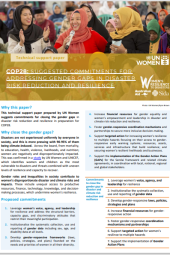COP28: Suggested Commitments for Addressing Gender Gaps in Disaster Risk Reduction and Resilience
Summary
This technical support paper suggests commitments to closing the gender gaps in disaster risk reduction and resilience in preparation for COP28. Disasters are not experienced uniformly by everyone in society, and this is more pressing with 90-95% of them being climate-induced. Across the board, from mortality, to education, health, violence, livelihoods, and nutrition; women are negatively and disproportionately impacted. This was confirmed in a study by UN Women and UNICEF, which identifies women and children as the most vulnerable to disasters and threats combined with uneven levels of resilience and capacity to recover. Gender roles and inequalities in society contribute to women’s disproportionate disaster and climate risks and impacts. These include unequal access to productive resources, finance, technology, knowledge, and decision-making processes, which undermine women’s resilience.
Categories:
Bulletins, GEDSI
Publisher:
UN Women
Published Year:
2023
